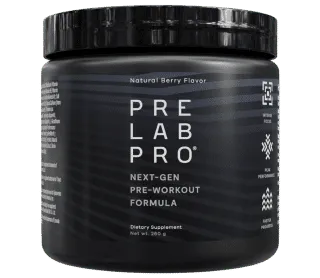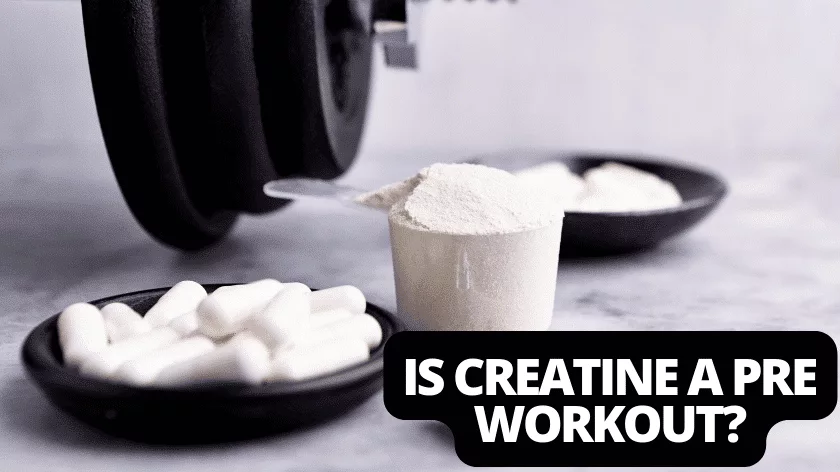Of all the supplements out there, creatine is probably one of the most misunderstood. Some people think it’s a steroid, while others believe it’s a miracle drug that can help you build muscle and improve your performance.
The truth is, creatine is neither of those things. It’s simply a compound that is found naturally in your body and certain foods. And when you take creatine as a supplement, it helps your muscles store more energy, which can lead to improved performance and increased muscle mass.
But is creatine a pre workout? Yes and no.
If you’re looking for an energy boost before you hit the gym, creatine can help. It can give you the extra edge you need to push yourself harder and longer. However, because of its role in muscle recovery, taking it after your workout may be preferable [1].
This article will explore how to make the most of creatine and answer some of the most common questions about this popular supplement.
Let’s dive in!
The Benefits of Creatine
As any gym-goer knows, building muscle isn’t easy. It takes hours of lifting weights and eating right, with little room for error. So it’s no surprise that people always seek something that can give them an edge.
Creatine is one such supplement.
Often used by bodybuilders and athletes, creatine has been shown to increase muscle mass and strength. It can also improve your performance in short, high-intensity activities like sprinting and weightlifting.
But what is it about creatine that makes it so effective?
Well, as we mentioned before, creatine helps your muscles store more energy. This is because it increases the levels of ATP (adenosine triphosphate), the energy source your muscles use for short bursts of activity.
With more ATP available, your muscles can work harder and longer before they become fatigued. This is why creatine is so popular among sprinters and other athletes who rely on explosive movements.
For anyone looking to improve their physical performance, you can’t go far wrong by taking creatine. It’s a tried-and-tested supplement that is safe and effective for most people.
Pre Lab Pro – The World’s Smartest Pre-Workout

Looking to take your workouts to the next level? Pre Lab Pro is the world’s first true nootropic-enhanced pre-workout drink, supplying mind + body super-fuel for next-level athletic performance. Try it today and see the difference for yourself!
The Different Types of Creatine
You may think that all creatine is the same, but there are several different types on the market. The most common are monohydrate, ethyl ester, and hydrochloride.
Creatine Monohydrate
If you’re looking to gain an edge in your workout routine, you may have heard about a little something called creatine monohydrate.
This naturally occurring substance is found in muscle tissue, and it’s often taken in supplement form to increase muscle mass and improve athletic performance.
While some people are hesitant to take supplements, there’s no need to be wary of creatine monohydrate – it’s perfectly safe and has been extensively studied.
So if you’re looking to bulk up or get an extra energy boost during your next workout, give creatine monohydrate a try – your muscles will thank you!
Creatine Ethyl Ester
Creatine ethyl ester is a bit of a mouthful, but it’s nothing to be afraid of. It’s simply a variation of the popular supplement creatine that can be taken in smaller amounts.
If you don’t tolerate creatine well or have trouble digesting it, creatine ethyl ester may be a good option for you because you don’t need to take as much per serving compared to other types of creatine.
More studies are needed to confirm its effectiveness, but it is thought to be just as effective as creatine monohydrate in increasing muscle mass and strength.
And thanks to its smaller serving size, it may be more convenient for those who are constantly on the go and don’t have time to measure out a larger scoop of creatine monohydrate.
Creatine Hydrochloride
Creatine Hydrochloride, otherwise known as Creatine HCL, is a unique compound with various benefits for athletes and bodybuilders. It is a highly effective supplement that can help to increase muscle mass, strength, and power.
Creatine HCL is made by combining creatine with hydrochloric acid, which is thought to enhance water solubility and increase absorption.
Although one of the newer forms of creatine on the market, it is fast becoming a popular choice among those looking to improve their physical performance.
And if you’re someone who struggles with stomach cramps or other digestive issues when taking creatine, Creatine HCL is worth considering as it is thought to be easier on the stomach.
No matter which form of creatine you choose, you will likely see benefits if you take it consistently. So try a few different types and see which works best for you.
The Best Time to Take Creatine
As with any other supplement on the market, getting your timing right will often be the key to success.
So when is the best time to take creatine?
There is some debate on this topic, but the general consensus is that taking it shortly before or after your workout is ideal.
Creatine works best when taken consistently, so it’s important to find a time that works for you and stick to it. If you’re taking creatine before your workout, do so within 30 minutes of starting. And if you’re taking it after, aim for within an hour or so.
Of course, there is no need to be too rigid with your timing. If you miss a dose here and there, it’s not the end of the world. Just try to take it at around the same time each day to maintain consistent levels in your body.
Creatine Side Effects
Although creatine is considered to be a safe supplement, there are a few potential side effects that you should be aware of.
The most common side effect is weight gain, as your muscles will hold onto more water when you take creatine. This is not necessarily a bad thing, but it is something to be aware of if you are trying to stay lean.
Creatine can also cause bloating and digestive issues in some people. If you are struggling with these side effects, try taking a smaller dose or switching to a different form of creatine.
Dehydration may also occur when you take creatine, so make sure to drink plenty of water throughout the day. Although, you should be already doing that anyway!
Overall, creatine is a safe and effective supplement that can help you to bulk up, increase your strength, and improve your athletic performance. Try out a few different types to see which works best for you, and drink plenty of water to avoid any potential side effects.
How Much Creatine Should You Take?
A typical dose of creatine is 3-5g per day, but you may need to experiment to find the right dose for you. Start with the lower end of the scale and increase your intake if you don’t see any results after a few weeks.
If you experience any side effects, reduce your intake or stop taking creatine altogether. Speaking with a doctor or certified nutritionist may also be a good idea if you are unsure about how much to take.
The Bottom Line – Is Creatine a Pre-Workout?
There’s no doubt that creatine is a powerful supplement with a whole host of benefits. But whether you take it pre-workout or not is up to you.
If you want to increase your energy levels and improve your gym performance, taking creatine before your workout could be a good option. Stay hydrated and start with a lower dose to avoid potential side effects.
But if you prefer to take it post-workout or even just on rest days, that’s perfectly fine too. The important thing is that you’re consistent with your intake and taking the right amount.
Give it a try and see how it works for you. And remember, there’s no one-size-fits-all approach when it comes to supplementation. The idea is to find what works best for you and your goals.





Leave a Reply